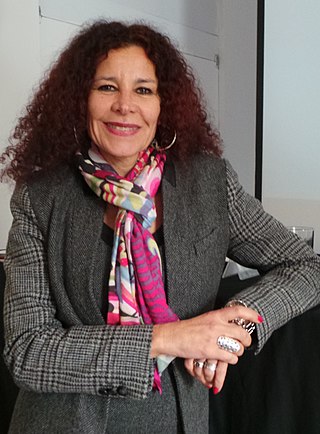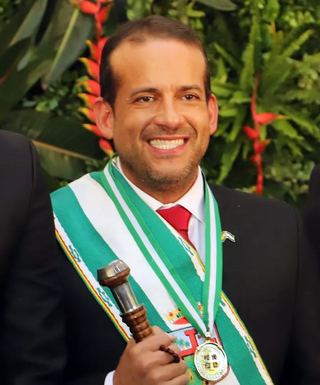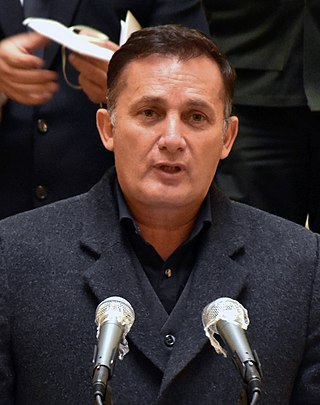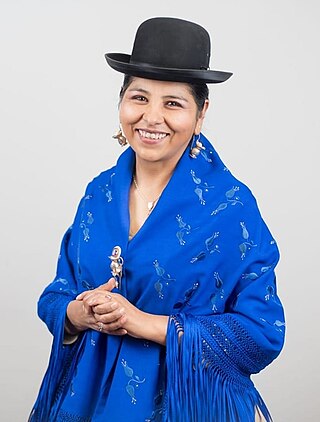Related Research Articles

Council of Ministers of Bolivia, or Cabinet of Bolivia, is part of the executive branch of the Bolivian government, consisting of the heads of the variable number of government ministries. The Council of Ministers are ministers of state and conduct the day-to-day business of public administration within Bolivia. The President of Bolivia may freely reorganize the executive branch, with the most recent comprehensive reorganization occurring in February 2009. Since then, the Ministry for the Legal Defense of the State has become the independent office of Solicitor General, and the Ministry of Communication has been created.

Elizabeth Cristina Salguero Carrillo is a Bolivian diplomat, journalist, politician, and women's rights activist who served as minister of cultures from 2011 to 2012. A member of the Movement for Socialism, she previously served as a party-list member of the Chamber of Deputies from La Paz from 2006 to 2009. In 2009, she was elected as a substitute party-list member of the Chamber of Deputies from La Paz but resigned before taking office in order to launch an ultimately unsuccessful La Paz mayoral campaign. From 2012 to 2015, she served as ambassador of Bolivia to Germany, and since then has worked as an international expert in strategic planning at UN Women.
The Supreme Court of Justice is the highest court of ordinary jurisdiction in Bolivia, based in Sucre. Its powers are set out in Articles 181–185 of the 2009 Constitution and the Law of the Judicial Organ. It was first seated on 2 January 2012.
Senkata is an area in the southern part of El Alto, Bolivia, and is part of the city's 8th District. El Alto is the second most populated city in Bolivia according to the 2012 census. Senkata has drawn international attention for the social protests of 2003, part of the October Massacre during the Bolivian gas conflict, and the Senkata Massacre, during the post electoral protests in Bolivia in 2019. In both events, an executive decree authorizing police and military intervention was followed by civilian deaths. In 2003, the intervention was supported by executive Decree 27209, and in 2019 the intervention was supported by Decree 4078, which exempted the Armed Forces of Bolivia of criminal responsibility. Decree 4078 was repealed on the 28th of November 2019 after Jeanine Áñez's government reached an agreement with social organisations.

Mi Teleférico, also known as Teleférico La Paz–El Alto, is an aerial cable car urban transit system serving the La Paz–El Alto metropolitan area in Bolivia. As of October 2019, the system consists of 26 stations along ten lines: Red, Yellow, Green, Blue, Orange, White, Sky Blue, Purple, Brown, and Silver. Further lines and extensions are in planning or construction.

Lilly Gabriela Montaño Viaña is a Bolivian physician, politician, and former senator. She was the elected President of the Plurinational Legislative Assembly, a position she accepted and would hold until 2020 while still the presidential representative of Santa Cruz de la Sierra for the Movement for Socialism (MAS) party. In 2012, Montaño was made the acting President of Bolivia for a short time. Montaño is a feminist and vocal defender of the rights of the LGBT community. She has been a regular guest and speaker at forums and conferences in different parts of the world. She married Argentine citizen Fabián Restivo, with whom she has had two daughters.

Silvia Velarde Pereyra, better known by her stage name, Sibah, is a Bolivian blues and rock and roll singer-songwriter.

Ana Verónica Ramos Morales is a Bolivian economist, university professor, and former general manager of the Productive Development Bank (BDP). She was the Minister of Productive Development and Plural Economy of Bolivia from January 2015 to January 2017, during the third government of President Evo Morales.
Mariana Prado Noya is a Bolivian business administrator and politician. She served as the Minister of Development Planning from 2017 to 2019, during the third government of Evo Morales.

Jeanine Áñez Chávez is a Bolivian lawyer, politician, and television presenter who served as the 66th president of Bolivia from 2019 to 2020. A former member of the Social Democratic Movement, she previously served two terms as senator for Beni from 2015 to 2019 on behalf of the Democratic Unity coalition and from 2010 to 2014 on behalf of the National Convergence alliance. During this time, she served as second vice president of the Senate from 2015 to 2016 and in 2019 and, briefly, was president of the Senate, also in 2019. Before that, she served as a uninominal member of the Constituent Assembly from Beni, representing circumscription 61 from 2006 to 2007 on behalf of the Social Democratic Power alliance.

Luis Fernando Camacho Vaca is a Bolivian activist, businessman, lawyer, and politician serving as the 2nd governor of Santa Cruz since 2021. He is the leader of Creemos, opposition bench in the Plurinational Legislative Assembly and was the chair of the Santa Cruz Civic Committee in 2019.

Arturo Carlos Murillo Prijic is a Bolivian businessman, hotelier, and politician who served as minister of government from 2019 to 2020. As a member of the National Unity Front, he previously served as senator for Cochabamba from 2015 to 2019 and as a plurinominal member of the Chamber of Deputies from Cochabamba from 2006 to 2010.

Yerko Martín Núñez Negrette is a Bolivian agronomist and politician who served as minister of the presidency from 2019 to 2020. A member of the Social Democratic Movement, he previously served as minister of public works from November to December 2019. Throughout his ministerial tenure, Núñez was noted as a key person of influence in the transitional government and a "right-hand" to President Jeanine Áñez, a fellow Beni native. Prior to his appointment, he served as senator from Beni from 2015 to 2019 on behalf of the Democratic Unity coalition. As a member of Beni First, Núñez served as mayor of Rurrenabaque from 2010 to 2014; he previously held the position for two terms from 2000 to 2003 and 2005 to 2010 as part of the Revolutionary Nationalist Movement. Núñez's mayoral tenure saw strides made for Rurrenabaque's ecotourism industry, which generated increased economic growth for the city.

María Nela Prada Tejada is a Bolivian diplomat and politician serving as the minister of the presidency since 2020. A member of the Movement for Socialism, she served as chief of staff under Luis Arce during his tenure as minister of economy from 2006 to 2017 and in 2019.

Luis Fernando López Julio is a Bolivian businessman, retired military officer, and politician who served as minister of defense from 2019 to 2020. Appointed in the tail end of the 2019 political crisis, López, along with Minister of Government Arturo Murillo, quickly became characterized as the "strong men" of the Jeanine Áñez administration and were implicated in the deadly events at Senkata and Sacaba. López was called to hearings by the Plurinational Legislative Assembly but failed to present himself three consecutive times, ultimately resulting in his censure by the legislature. As per the terms of the Constitution, he was dismissed as minister but, exploiting a loophole in the document's text, he was reappointed just a day later. Soon after, reports revealed his participation in the tear gas case, which accused the ministries of government and defense of irregularly purchasing non-lethal weapons at inflated prices.

The Arce Cabinet constitutes the 222nd cabinet of the Plurinational State of Bolivia. It was formed on 9 November 2020, one day after Luis Arce was sworn in as the 67th president of Bolivia following the 2020 general election, succeeding the Áñez Cabinet. The cabinet is composed entirely of members of the ruling Movement for Socialism. Described as a "technocratic" cabinet, it has been noted for the low-profile and youth of some of its members as well as its political distance from former president Evo Morales.
Events from the year 2022 in Bolivia.
The governor of Santa Cruz is the head of government of the Bolivian department of Santa Cruz. Established by the 2009 Constitution of Bolivia, the office of governor superseded the office of prefect, which was historically appointed by the president of Bolivia but in 2005 was made subject to popular will by election. The governor is eligible to be elected to two five-year terms, but must resign from office six months in advance of an election if they wish to be consecutively reelected.

Martha Yujra Apaza is a Bolivian politician and trade unionist who served as minister of cultures and tourism from 2019 to 2020. A prominent trade union leader in El Alto, Yujra was the only indigenous member of the Jeanine Áñez Cabinet and was the final official to head the Ministry of Cultures and Tourism; the institution was abolished during her term. During her tenure, Yujra's office primarily dealt with the effects of the COVID-19 pandemic on the cultural sector, devising means of alleviating the economic ramifications of quarantine measures on artisans and entertainers. She subsequently served as a counselor at the Embassy of Bolivia in Quito from July to November 2020. Prior to serving as minister, Yujra gained notoriety for her fierce opposition to the government of Evo Morales. In 2017, she led a breakaway faction of the pro-government El Alto Regional Workers' Center. As its executive secretary, Yujra aligned the union with the Bolivia Says No alliance, running unsuccessfully to represent La Paz in the Chamber of Deputies in the annulled 2019 general elections.

Bertha Beatriz Acarapi is a Bolivian politician and former television presenter serving as a party-list member of the Chamber of Deputies from La Paz since 2020. A member of the Movement for Socialism, she previously served as an El Alto municipal councillor from 2000 to 2004 on behalf of the Revolutionary Left Movement and from 2004 to 2010 on behalf of Plan Progress for Bolivia. During her second term, she served as president of the El Alto Municipal Council from 2006 to 2007, becoming the first woman to assume that post. Outside of politics, Acarapi's lengthy career in radio and television journalism led her to join ATB in 2015, becoming one of the country's first high-profile chola indigenous presenters.
References
- 1 2 3 "Reque Terán, al mando de las tres fuerzas - Diario Pagina Siete". Pagina Siete (in Spanish). 8 August 2016. Retrieved 29 November 2017.
- 1 2 AIRES, ABEL GILBERT / BUENOS (9 April 2015). "La primera generala del Ejército de Bolivia es la hija del hombre que capturó al Ché". El Periodico (in Spanish). Retrieved 29 November 2017.
- 1 2 3 "Gina Reque Terán: 'Cada jornada es un día de reto y desafío' - La Razón". La Razon (in Spanish). 22 May 2013. Retrieved 29 November 2017.
- ↑ "Gina Reque Terán es la primera mujer que logra el máximo grado en el Ejército de Bolivia". Eju TV (in European Spanish). 17 June 2016. Retrieved 29 November 2017.
- 1 2 3 "Gina Reque Terán : "Me gustan los tacos altos"". Eju TV (in European Spanish). 6 May 2013. Retrieved 29 November 2017.
- 1 2 3 "Bolivia Has Its First Woman General Commanding Combat Troops". NBC News. 17 March 2015. Retrieved 29 November 2017.
- 1 2 Post, Latin (31 December 2015). "Gina Reque Teran Becomes First Woman to Be Named Bolivia's Military General Staff". Latin Post. Retrieved 29 November 2017.
- ↑ Molina, Fernando (31 December 2015). "La hija del militar que capturó al Che, jefa del Ejército boliviano". El Pais (in Spanish). Retrieved 29 November 2017.